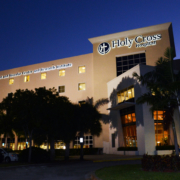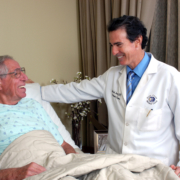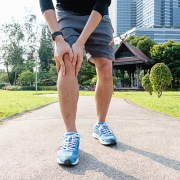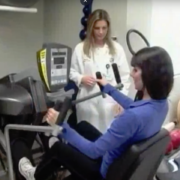Managing Post-Operative Pain
At the Leone Center for Orthopedic Care, we have found that post-operative pain is one of the most prevalent anxieties that patients have prior to undergoing hip or knee replacement surgery. Allaying that concern, by outlining what to expect and how pain will be managed, is a major focus of the pre-operative education that is provided one-on-one by my staff and me.
In my experience, I have found that patients who go into surgery with a better understanding of what will happen and what to expect not only have less anxiety but also less post-operative pain.
As part of the Leone Center surgical protocol, we have a two-pronged philosophy for post-operative pain management:
- Stay ahead of the pain curve. It is preferable and easier to prevent pain than to play “catch-up” by trying to decrease pain after it occurs.
- Pain is more effectively managed with a multi-modal approach that includes everything from the type of anesthesia used during surgery to the pain medication and physical therapy given after surgery.
Your surgeon should outline the pain-management protocol for you prior to the procedure. Here is a general outline of the post-operative pain management regimen we use at the Leone Center for Orthopedic Care:
- Medication administered prior to the start of surgery includes:
- Tylenol to make patients less sensitive to and decrease the amount of pain
- A non-steroidal anti-inflammatory that helps block a certain enzyme which decreases pain and inflammation
- An IV medicine to make patients drowsy and help decrease anxiety
- A narcotic to dull pain receptors before pain sets in, as well as medication to prevent nausea following surgery.
- An IV steroid to decrease to body’s pain response to the surgery resulting in less pain
- IV fluids to increase the body’s intravascular volume which improves the effectiveness of the anesthesia and helps prevent post-op nausea and low blood pressure.
- IV antibiotics prior the starting surgery to lower the risk of infection
- Most of my patients have regional or spinal anesthesia. The final decision regarding what type of anesthesia you will receive is made between you and the anesthesiologist. Some patients have a medical condition that makes one type of anesthesia safer or more appropriate than another. There are a number of advantages to regional anesthesia when getting a knee or hip replacement, including:
- Patients tend to require fewer drugs during the procedure and for pain after their surgery.
- Patients wake up more gradually and hence any pain that they have is easier to control and typically with less medicine.
- Patients who receive spinal anesthesia tend to have less nausea than those who receive general anesthesia because they received fewer drugs and smaller dosages.
- Whether a patient has a spinal or general anesthetic, all patients sleep completely throughout the procedure and most have no recollection of any events in the operating room including the placement of a spinal if performed.
- Because patients are not intubated during surgery to control breathing, they do not have a sore throat after surgery.
- Most patients lose less blood when surgery is performed with spinal anesthesia compared to a general, decreasing the probability of a blood transfusion.
- In the recovery room, my patients receive Tylenol. They also receive IV Toradol which is an NSAID and works to decrease pain via an alternate “pathway”. It has proven to be remarkably effective. Many patients are given a low dose of a narcotic which both decreases pain and potentiates (makes more effective) the other medicines which are given. The amount of narcotics and other medicines given to an individual patient is of course “customized.” I see patients getting far less narcotics than they would have gotten historically. Many patients who are older or patients who tell us they are “sensitive to medicines or narcotics” often do not require any narcotics.
- During both hip and knee replacement surgery, I locally inject a “cocktail” of three different medicines into the surrounding tissues which greatly decreases pain for the first 24 to 30 hours after surgery. Also, because of this local injection, the dose of narcotics and other meds is less because they are not in pain. And when the local injection starts to wear off, it does so slowly, so PO (by mouth) pain meds can be taken. After 24 to 30 hours, patients are typically home, mobile, and feel confident because they know what to expect. Safety is enhanced because people who are mobile and independent have a lesser risk of a blood clot, skin breakdown, or a urinary problem. They are also happier.
- Patients receiving a total or partial knee replacement surgery receive an adductor nerve block after they are fully asleep but prior to the procedure actually starting. Local anesthesia is injected into the thigh which anesthetizes multiple sensory branches of the femoral nerve. This block also lasts for approximately 24-30 hours when our patients are home and mobile.
- Most patients walk several hours after their surgery with a therapist. Most patients go home shortly after that. Some patients stay on our specialty orthopedic floor for a day or two before going home. Occasionally going to a rehabilitation facility after their stay at a Holy Cross Health is most appropriate. When they get home, we arrange for a therapist to come to their home.
- For the first 2 or 3 days after surgery whether a person goes home that afternoon or is admitted, we encourage pain meds are taken on a schedule rather than as needed. This strategy preempts pain from starting and helps “down-regulate” pain that does develop. Typically, after 2 or 3 days, pain meds are taken on an “as needed basis.”
At the Leone Center and Holy Cross Health, we are sensitive and focused on preventing, decreasing, and managing any post-operative pain. Each individual experiences and reacts to pain differently. We “customize” our pain regimen for each person. We make adjustments by monitoring closely and communicating with patients after surgery. Our goal is to minimize pain, which is something we are all afraid of. We’ve repeatedly learned that when patients don’t experience a lot of post-operative pain and mobilize quickly, they more quickly returned to their independent and active lifestyle and HAVE A BETTER EXPERIENCE. They also have fewer complications. And that is our goal.












